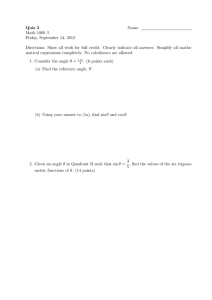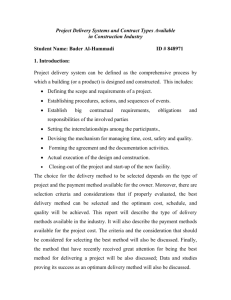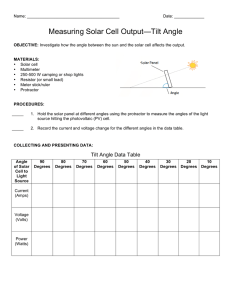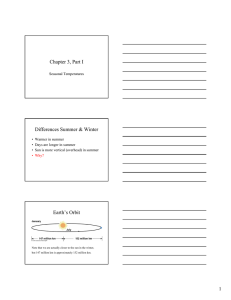Optimum Tilt Angle and Orientation of Solar Surfaces in Abu Dhabi
advertisement
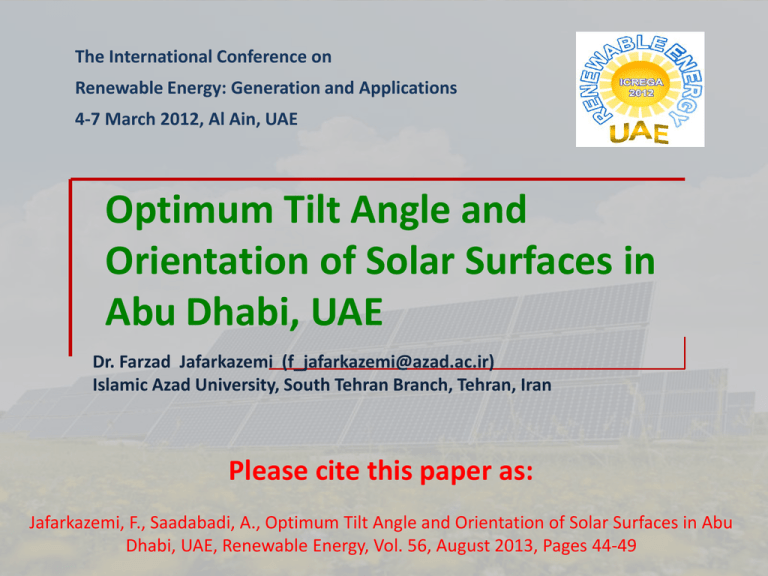
The International Conference on Renewable Energy: Generation and Applications 4-7 March 2012, Al Ain, UAE Optimum Tilt Angle and Orientation of Solar Surfaces in Abu Dhabi, UAE Dr. Farzad Jafarkazemi (f_jafarkazemi@azad.ac.ir) Islamic Azad University, South Tehran Branch, Tehran, Iran Please cite this paper as: Jafarkazemi, F., Saadabadi, A., Optimum Tilt Angle and Orientation of Solar Surfaces in Abu Dhabi, UAE, Renewable Energy, Vol. 56, August 2013, Pages 44-49 Contents 2 Motivation of this research Motivation of this research Motivation of this research Miss-alignment in Small systems Abu Dhabi Municipality, 100kW Sheikh Sultan Bin Zayed Mosque, 55kW New PV Installations Abu Dhabi National Exhibition Centre 100 kW Al Mamoura Building, 210kW Abu Dhabi Distribution Centre Car Park, 125kW Abu Dhabi Aircraft Technology Centre, 300kW Officers Club, 100 kW Masdar Institute, 1MW Methodology 15 Methodology 16 Methodology Linear (Angstrom – Prescott) Quadratic (Akinoglu & Ecevit) Third order (Samuel) Logarithmic (Ampratwum & Dorvlo) Linear – Logarithmic (Newland) Exponential (Elagib & Monsell) Power (Coppolino) A. ASSI and M.JAMA, Predicting Global Solar Radiation on Horizontal Using Sunshine Duration in Abu Dhabi – UAE, 25th European Photovoltaic Solar Energy Conference, Sep. 2010, Spain M.D. Islam, I. Kubo, M. Ohadi and, A.A. Alili, Measurement of Solar Energy Radiation in Abu Dhabi , UAE), Applied Energy, 2009 NASA SSE model (22-year average) National Center of Meteorology and Seismology(NCMS) in Abu Dhabi 17 Measurements-2 National Center of Meteorology and Seismology(NCMS) in Abu Dhabi A. ASSI and M.JAMA, Predicting Global Solar Radiation on Horizontal Using Sunshine Duration in Abu Dhabi – UAE, 25th European Photovoltaic Solar Energy Conference, Sep. 2010, Spain 18 Methodology Month Jan Feb Mar Apr May Jun Jul Aug Sep Oct Nov Des Global solar radiation on horizontal surface NASA SSE model M.D. Islam et. al 14.72 14.08 17.28 17.42 18.83 20.63 22.75 22.79 25.85 25.06 26.03 24.62 23.22 24.52 22.75 23.51 21.78 22.32 19.40 19.40 16.31 15.26 13.61 11.30 19 Methodology 2 3 1.391 - 3.560 K T + 4.189 K T - 2.137 K T if 2 3 H 1.311 - 3.022 K T + 3.427 K T - 1.821 K T if Hd HO s 81.4 s 81.4 360 n 1 + 0.033 cos 24 × 0.0036 × Gs 365 cos cos sin sin sin s s 180 KT H HO 20 Methodology 2 Month Jan Feb Mar Apr May Jun Jul Aug Sep Oct Nov Dec H 14.72 17.28 18.83 22.75 25.85 26.03 23.22 22.75 21.78 19.40 16.31 13.61 Hd Hb Ho 4.37 5.77 6.97 7.57 7.61 7.80 8.24 7.80 6.87 5.73 4.30 4.21 10.35 11.51 11.86 15.18 18.24 18.23 14.98 14.95 14.91 13.67 12.01 9.40 24.33 28.57 33.39 37.54 39.76 40.41 39.96 38.25 34.78 29.90 25.27 23.06 KT 0.61 0.60 0.56 0.61 0.65 0.64 0.58 0.59 0.63 0.65 0.65 0.59 21 Methodology HT R × H R = D+ H d 1 + cos 2 H 1 - cos + g 2 max(0, G (ss , sr )) D max0, G (ss ,sr ) G (s , sr ) if ss sr if ss sr bA ( a' B)( ) (a' A bB) (sin sin ) 1 2 1 2 180 2 1 G (1 , 2 ) = aC (cos1 - cos2 ) (bA/2) sin 1 cos1 - sin 2 cos 2 2d 2 2 bC / 2 sin 1 sin 2 | sr |= min s , cos-1 AB + C A 2 - B 2 + C 2 )/(A2 + C 2 ss min s , cos-1 AB - C A 2 - B 2 + C 2 )/(A2 + C 2 sr sr sr ss if (A > 0 & B > 0 )or A B if otherwise ss ss if (A > 0 & B > 0 )or A B if otherwise 22 Optimum Orientation Optimum orientation for fixed tilt angle is south direction, except tilt angles more than 75o. From this point, optimum orientation is 50o. 23 Optimum Orientation 2 Azimuth angle opt Global Radiation Ratio to radiation on horizontal 0 10 20 30 40 50 60 70 80 90 22 22 21 21 19 17 14 10 6 0 7746.9 7737.6 7709.8 7665.3 7606.1 7536.3 7462.3 7394.3 7345.4 7327.7 1.057 1.056 1.052 1.046 1.038 1.028 1.018 1.009 1.002 1.000 24 Optimum Tilt Angle 2 Solar radiation on inclined surface is a function of tilt angle and the Optimum tilt angles are different for months. 25 Optimum Tilt Angle 2 Solar radiation on inclined surface is a function of tilt angle and the Optimum tilt angles are different for months. 26 Optimum Tilt Angle 27 Optimum Tilt Angle 2 Monthly opt Jan Feb Mar Apr May Jun Jul Aug Sep Oct Nov Dec 50 39 25 10 -3 -9 -6 5 20 36 48 52 Ht Seasonal 20.54 20.78 Winter 20.06 22.85 25.74 Spring 26.15 23.19 22.66 Summer 22.63 22.63 22.33 Autumn 19.66 opt 39 -1 6 45 Ht 20.25 20.78 19.64 22.53 25.73 25.97 22.85 22.65 22.12 22.42 22.30 19.55 Bi-annual Heating period Cooling period Heating period opt Ht Yearly 20.39 42 20.76 19.43 22.68 25.67 25.81 Whole 2 23.04 (Entire) 22.64 21.80 22.54 42 22.22 19.42 opt Ht 22 18.62 20.05 20.04 22.49 24.02 23.52 21.36 21.93 22.62 22.10 20.44 17.53 28 Optimum Tilt Angle 2 Period of time Monthly Seasonal Bi-annual Fixed Yearly Fixed Vertical Fixed Horizontal Ht Ratio to radiation on horizontal surface 8189 8115 8104 7747 4304 7328 1.117 1.107 1.105 1.057 0.587 1 Comparison between annual solar radiation shows that, the best choose is using the bi-annual tilt angle(twice a year). 29 Optimum Tilt At Different Orientation Optimum tilt angles change by diversion of surface from the south direction. Maximum effect in autumn and winter months. 30 Optimum Tilt At Different Orientation 2 Even by adjusting optimum tilt angle for every azimuth angle, Solar radiation on a tilted surface decreases in autumn and winter months. 31 Radiation on Vertical Surface Source: BIPV for the GCC region, Mahieddine Emziane, WFES 2012 32 Radiation on Vertical Surface 2 Monthly solar radiation on a west-facing vertical surface is more than south-facing in summer month and it is different for autumn and winter. 33 Radiation on Vertical Surface 2 Azimuth Angle ( ) Annual solar radiation 0 10 20 4153 4317 4432 30 40 50 60 70 80 90 4498 4517 4496 4446 4383 4326 4304 The optimum orientation for vertical solar surface is 40o when monthly adjustment is used. 34 Conclusions Adjust the tilt angle, at least twice a year. The yearly optimum tilt angle for Abu Dhabi is (βopt =22o). The optimum orientation angle is in the south direction. Adjusting the optimum tilt angle to different orientations making up the loss of solar radiation. The optimum tilt angle decreases by diversion from the south direction. Vertical surfaces facing west receive higher solar radiation in summer in comparison to those facing south. 35 Thanks For Your Attention

